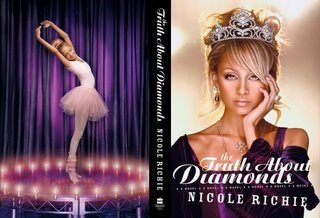
Holiday reading for PGC normally involves a light-hearted mix of essays by J.K. Galbraith, a couple of Joseph Conrad novels, and the occasional romance by Jean Genet. Imagine our surprise, then, to find a hefty volume entitled The Truth About Diamonds: A Novel A Novel A Novel wedged firmly in our Christmas stocking – a literary bottle-neck of exhausting proportions. Groan. Last year we were burdened with Paris Hilton’s emotionally taxing Confessions of an Heiress, which we barely finished in time for Christmas lunch. Here we were again, just twelve months later, with another weighty tome in our hands and not a Cliff’s Notes in sight. Having battled our way through TTAD: ANANAN, PGC feels it is only fair that we provide a comprehensive analysis of this important work for the benefit of future students of English literature. For Nicole Richie is a creative force likely to shape the course of modern fiction. Her style is so challenging, and her idiom so nuanced, she is at times difficult to follow. For those who persevere, however, TTAD: ANANAN is a rewarding experience.
The first hurdle for the novice reader to overcome is the confusing similarity between the novel’s protagonist, Chloe Parker, and the author’s own personal history. Derided by some critics as a shameless act of self-promotion, PGC hails this audacious foray into the th
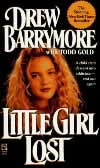 ird person as a milestone in modern literature. One can only imagine the amount of ‘tweaking’ Richie’s raw, uncompromising prose would have required to neutralise its defamatory content if it had been written using the characters’ real names. Thus, it seems all the more plausible for Richie to retreat into the background, shielded from potential litigation as she cunningly positions herself in the authorial voice of ‘Nicole.’ Too subtle? We thought so. But then, Richie likes to play games with the English language that are still illegal in Queensland. In fact, PGC has not seen such an audacious attempt to disrupt and destabilise the literary status quo since Drew Barrymore’s controversial use of italics in the epic novel Little Girl Lost.
ird person as a milestone in modern literature. One can only imagine the amount of ‘tweaking’ Richie’s raw, uncompromising prose would have required to neutralise its defamatory content if it had been written using the characters’ real names. Thus, it seems all the more plausible for Richie to retreat into the background, shielded from potential litigation as she cunningly positions herself in the authorial voice of ‘Nicole.’ Too subtle? We thought so. But then, Richie likes to play games with the English language that are still illegal in Queensland. In fact, PGC has not seen such an audacious attempt to disrupt and destabilise the literary status quo since Drew Barrymore’s controversial use of italics in the epic novel Little Girl Lost.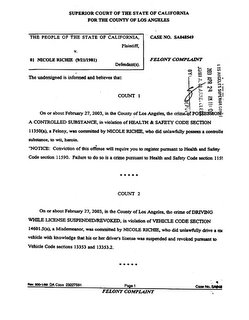
Critics are scrambling to discover where Richie learned her craft, and creative writing schools across the US are understandably desperate to claim Richie as an alumni. It will come as no surprise to PGC readers, though, to discover that Richie is largely self taught. She describes her tumultuous apprenticeship thus: ‘I went to the University of Arizona. I stopped because I went there for two years and I felt like I experienced college or whatever. I'm over it. I like Hollywood better.’ Instead, it seems Richie honed her creative talents developing semi-obscene tattoos to cram onto her cadaverous frame and scratching absurdist pop lyrics in rehab facilities. Part of the great mystery of Nicole Richie is how the publicity-shy actress found the strength to bare her soul so openly in a written form. As she ruminated once in a rare interview: ‘I've just gone through so much in my life that pulling my top up just doesn't seem like that big a deal.’
This remarkable capacity for self restraint is only too apparent in TTAD: ANANAN, as Richie’s brutally honest self-portrayal as a sturdy, responsible pillar of the Hollywood community unfolds: ‘When Chloe’s number popped up on my cell at mid-night one night, I was already being driven home after the opening of a good friend’s new boutique…I smiled, catching my own grin in the rear view mirror of my own limo.’ Richie’s brisk economy of words, punctuated with odd similes and unexplained pauses, not only saves paper, but vocabulary: ‘Saying “hi” like I did…with the gentleness of stroking a newborn kitten, was my way of apologising and
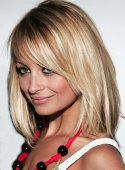 asking for another chance. Just…”hi.”’ Indeed, nowhere is Richie’s precocious talent more apparent than in her efficient command of the fullstop, which she flaunts repeatedly: ‘I discreetly excused myself and found the ladies’ room, which was like a palace of lavender marble. It truly was…something.’ PGC does not mind admitting that we were almost reduced to tears by this passage. Richie’s crisp prose, her economy of words and rhythmic timing all combine to make this emotionally-charged toilet scene almost…something. If you thought Richie’s only contact with toilets was throwing up in them, think again. Anyone who can cram the words ‘translucent,’ ‘diaphanous’ and ‘gak sak’ into a description of a toilet deserves to be taken seriously.
asking for another chance. Just…”hi.”’ Indeed, nowhere is Richie’s precocious talent more apparent than in her efficient command of the fullstop, which she flaunts repeatedly: ‘I discreetly excused myself and found the ladies’ room, which was like a palace of lavender marble. It truly was…something.’ PGC does not mind admitting that we were almost reduced to tears by this passage. Richie’s crisp prose, her economy of words and rhythmic timing all combine to make this emotionally-charged toilet scene almost…something. If you thought Richie’s only contact with toilets was throwing up in them, think again. Anyone who can cram the words ‘translucent,’ ‘diaphanous’ and ‘gak sak’ into a description of a toilet deserves to be taken seriously.Chloe’s enc
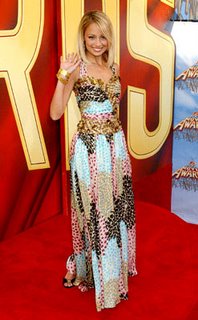 ounter with a pair of tabloid reporters in the opening scene also showcases Richie’s mastery of self-reflexiveness: ‘It turned out a paparazzo had been following them the entire time, and since neither of them were famous, they weren’t used to making sure they weren’t being tailed every ten seconds like I am.’ Chloe, we soon learn, is a Hollywood innocent on the cusp of celebrity with a penchant for street-level self defence and men with gastric by-passes. Astute readers will not fail to notice the depth of this characterisation intensify throughout the novel. At the start of Part One (titled Before): ‘Chloe’s mailing address might have been her mom’s place in Bel Air, but the place to find her – and more importantly the place where she was finding herself – was whatever party was hottest at the moment.’ By the end of Part Two, however, (titled, intriguingly, After): ‘…she was a grown woman with rehab under her Versace belted halter dress and a red-hot reality project that was making her a household name.’
ounter with a pair of tabloid reporters in the opening scene also showcases Richie’s mastery of self-reflexiveness: ‘It turned out a paparazzo had been following them the entire time, and since neither of them were famous, they weren’t used to making sure they weren’t being tailed every ten seconds like I am.’ Chloe, we soon learn, is a Hollywood innocent on the cusp of celebrity with a penchant for street-level self defence and men with gastric by-passes. Astute readers will not fail to notice the depth of this characterisation intensify throughout the novel. At the start of Part One (titled Before): ‘Chloe’s mailing address might have been her mom’s place in Bel Air, but the place to find her – and more importantly the place where she was finding herself – was whatever party was hottest at the moment.’ By the end of Part Two, however, (titled, intriguingly, After): ‘…she was a grown woman with rehab under her Versace belted halter dress and a red-hot reality project that was making her a household name.’(Left) Red Hot Reality: Chloe.....errrr Richie appears at the MTV awards with rehab under her Versace belted dress
Reality projects notwithstanding, Richie strenuously avoids the temptation to launch militant attacks on her former associates. ‘Is anyone perfect?’ she demands testily in the preface, ‘No. Only a perfect diamond looks good that close up…All the people in this n
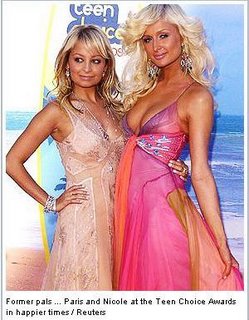 ovel are fictional, but like real people, they’re flawed. And even though I adore her…my diamond in the rough, Chloe is no exception.’ Neither, it would seem, are the other dramatis personae, particularly Chloe’s wayward childhood friend and red-hot-reality-co-star: Simone Westlake. Students of structuralism and semiotics worldwide remain baffled by this odd choice of pseudonym, and have requested the services of encryption experts to decode this oblique reference to Paris Hilton. Not only does this ingenious device provide Richie with an opportunity to take a couple of vicious swipes at Paris, it also provides a vehicle for her incisive wit. PGC particularly enjoyed the gripping scene where Chloe’s mother confronts her about her drug use: ‘”Who taught you to do this? To trip the lizard?” Chloe laughed before she could stop herself. “It’s chasing the dragon, Mom.” But the question was just as hilarious. Who had taught Chloe about drugs? The problem could be traced – as so many problems could be – back to Simone.’
ovel are fictional, but like real people, they’re flawed. And even though I adore her…my diamond in the rough, Chloe is no exception.’ Neither, it would seem, are the other dramatis personae, particularly Chloe’s wayward childhood friend and red-hot-reality-co-star: Simone Westlake. Students of structuralism and semiotics worldwide remain baffled by this odd choice of pseudonym, and have requested the services of encryption experts to decode this oblique reference to Paris Hilton. Not only does this ingenious device provide Richie with an opportunity to take a couple of vicious swipes at Paris, it also provides a vehicle for her incisive wit. PGC particularly enjoyed the gripping scene where Chloe’s mother confronts her about her drug use: ‘”Who taught you to do this? To trip the lizard?” Chloe laughed before she could stop herself. “It’s chasing the dragon, Mom.” But the question was just as hilarious. Who had taught Chloe about drugs? The problem could be traced – as so many problems could be – back to Simone.’Among the accusations levelled at Paris (aka Simone) in TTAB we find murder (at a
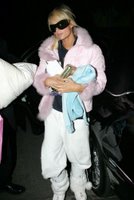 ge four), followed by drug use (age 11), right-wing extremism (14), promiscuity (on-going), and - crushingly - poor taste in interior design. Read between the lines, though, and subtle references throughout the book point unmistakably to Hilton’s determined and repeated breach of copyright through the publication of artistic mobile phone images (‘I’m thinking of selling them to a British newspaper because they can show tits in the paper over there.’), her possible involvement in welfare fraud (‘Oh, yeah – and I’m not pregnant after all, so don’t worry about that either.’) and, most chillingly, her unconventional approach to breast augmentation (‘She was stuffing her bra with expensive silk scarves…warning Chloe never to use toilet paper for fear “your tits will smell like ass, and no guys will ever want to sleep with you.”’) Right: Cruel attacks on Paris Hilton take their toll....
ge four), followed by drug use (age 11), right-wing extremism (14), promiscuity (on-going), and - crushingly - poor taste in interior design. Read between the lines, though, and subtle references throughout the book point unmistakably to Hilton’s determined and repeated breach of copyright through the publication of artistic mobile phone images (‘I’m thinking of selling them to a British newspaper because they can show tits in the paper over there.’), her possible involvement in welfare fraud (‘Oh, yeah – and I’m not pregnant after all, so don’t worry about that either.’) and, most chillingly, her unconventional approach to breast augmentation (‘She was stuffing her bra with expensive silk scarves…warning Chloe never to use toilet paper for fear “your tits will smell like ass, and no guys will ever want to sleep with you.”’) Right: Cruel attacks on Paris Hilton take their toll....Like Paris Hilton’s Simone, Nicole Richie’s Nicole is also prone to philosophy, wryly observing that ‘…fame is hungry. In the same way girls like to chase their sweet with a little salt, fame requires a misery chaser to every ounce of joy.’ Part political satire, part penetrating socio-cultural critique, Richie’s dazzling flair for abbreviation captures the vernacular of her troubled teen characters so well, it is a mystery to PGC why she didn’t release the entire volume as one continuous SMS. W/E! One wonders how Richie plans to follow up this masterpiece. A scathing pod cast on former fiancée Adam Goldstein, dimly personified as ‘DJ Ray’? A couch-thumping appearance on Oprah’s book club? Or something more conspicuous? A Truth about diamonds and Reconciliation Commission is PGC’s suggestion, capped off with Richie making a dramatic birqua-clad dash down the steps of the court room when Hilton arrives to give evidence. (If, for no other reason, than to fling the garment across Hilton's nether regions as she exists the limo)
Like so many other ‘electrifying first novels’, Richie’s masterpiece resists a genre. Unless, of course ‘el
 ectrifying first novels’ can be deemed a genre in itself. PGC initially considered TTAD to be an uneasy alliance between children’s literature and large print reading material for brain trauma outpatients. However, we now suspect that TTAD discloses all the hallmarks of the ‘drug-addled as a teenager/slim grasp of English as an adult’ genre, epitomized by Pamela Anderson in her ground-breaking work Starstruck: A Novel. Critics agree that this startling composition has raised the bar for Richie with its skilful blend of absurdist comedy and soft-core pornography, captured poignantly in the opening scene: ‘Why do my nipples hurt? was Star's first thought as she woke from a strangely deep sleep, her hands gliding along her naked body...’.
ectrifying first novels’ can be deemed a genre in itself. PGC initially considered TTAD to be an uneasy alliance between children’s literature and large print reading material for brain trauma outpatients. However, we now suspect that TTAD discloses all the hallmarks of the ‘drug-addled as a teenager/slim grasp of English as an adult’ genre, epitomized by Pamela Anderson in her ground-breaking work Starstruck: A Novel. Critics agree that this startling composition has raised the bar for Richie with its skilful blend of absurdist comedy and soft-core pornography, captured poignantly in the opening scene: ‘Why do my nipples hurt? was Star's first thought as she woke from a strangely deep sleep, her hands gliding along her naked body...’.But what does the literary establishment make of TTAD? How many karats is Richie’s masterwork fetching on the ruthless market of high-brow criticism? This is what the newspapers had to say:
–The New York Post"Shockingly entertaining."
–Chicago Tribune"[A] gem of a book."
Richie is also faring well online among the usually prickly under-12 demographic:
January 16, 2006
TheDivineMsF "*J.O.S.E*" (Philly, PA USA) writes on E-Bay Reviews and Guides:
'Nicole is my god, and this book really surprised me. I mean I know Nicole is awesome at things like shopping & making people laugh on the Simple Life when she isn't busy being the fabulous Socialite that she is...but I never expected her to be such a good writer. What can't this fashionista do? If you're a fan of Nicole or even if you're not this book will prove to be a good read. Buy it, it's worth it.'
Meanwhile, Erin Laporte, gives TTAD 4 out of 5:
‘I just finished reading her book and was totally satisfied with what I read. I bought the book with the intent of reading about fun parties, socialites, extremely wealthy young people, and light entertainment...Nothing heavy!! I am definitely not a huuuuuge Nicole Richie fan (although I like her way more than Paris) but after reading this book, I have more respect for Nicole and am happy that she decided to write this book.’
Step aside Gertrude Stein – literary cubism has a new poster child. As some random chick on a random internet review says, "Buy it!"

1 comment:
Excellent Review. I feel that the copy collecting dust on my shelf should probably be given a read.
But I made a promise to myself I wouldn't read it until she ate some food again.
Long wait, I know.
Post a Comment